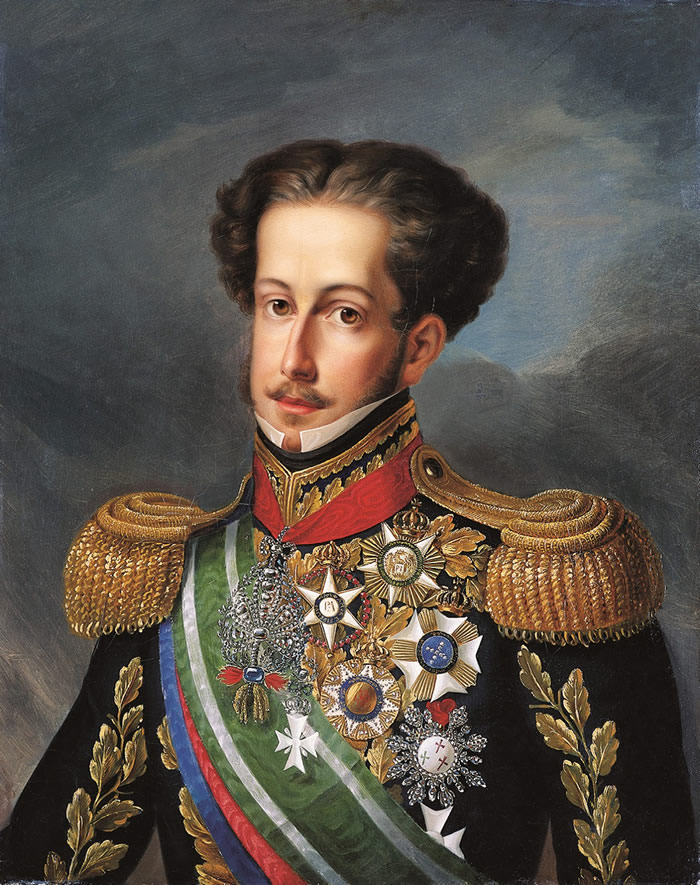 |
| Pedro I |
Pedro I, or Dom Pedro, was the son of King João VI of Portugal. His family fled to the Portuguese colony of Brazil when Napoleon I threatened to invade Portugal in 1808. The arrival of the Braganza (Bragança) family, the royal family of Portugal, in the only major Portuguese colony in South America, created a national identity for Brazilians.
João VI ruled both Brazil and Portugal from South America until 1821 and did not want to return to Portugal. He liked Brazil and was afraid another European country would try to seize it if he left to return to Europe.
As a father of a future monarch, King João VI was negligent. An unattractive man, he ignored his handsome and high-spirited son. Pedro spent much of his early years in the company of servants in the royal household without parental or other responsible supervision. He received no training for the life that was to be his destiny.
  |
In 1821 King João left his son as regent of Brazil and returned to Portugal. José Bonifáco de Andrada e Silva, who had studied in Paris at the time of the French Revolution, became Pedro I’s main adviser. However, the handsome, vivacious, and dishonest Pedro had not been raised to listen to wise advice. Pedro backed the party of Brazilians who advised King João to return to Portugal.
When João VI arrived back in Portugal, the Portuguese government began a plan that restricted the sovereign powers of Brazil, returning it to colony status. Pedro I was to be little more than governor of Rio and the southern provinces of Brazil. Although he was irritated by these maneuvers, Pedro hesitated to assert his authority in defiance of the Portuguese assembly, the Cortes, because he did not want to give up his claim to the throne of Portugal.
High-handed orders from the Portuguese government in Lisbon irritated the Brazilians as well as their future ruler, Pedro I. On January 9, 1822, Pedro I refused an order to return to Portugal, saying: “Fico!” (“I shall stay”). Today, January 9th is a holiday in Brazil called Dia Do Fico (I Shall Stay Day). Finally Pedro and the Brazilian party threw Portuguese officials out of Rio de Janeiro and other provinces.
However, not all Brazilian provinces supported the move toward independence. Pedro made a tour of the provinces to gain support and hired a British admiral to help drive the Portuguese forces out of Brazil. Pedro managed to persuade most Brazilians they would be better off as an independent country.
Pedro was popular with members of Brazil’s aristocratic upper class who resented Portuguese-born government officials and were glad to see them leave. In September 1822 Pedro declared Brazil’s independence from Portugal and soon after was crowned Emperor Pedro I of Brazil. He convened the first constituent assembly of Brazilians.
Meanwhile, José Bonifáco urged Pedro to develop a constitutional monarchy in Brazil. Others in Brazil wanted a traditional monarchy. The new emperor did not wish to lessen his own royal authority. He told the Brazilian assembly he would consider no documents he deemed unworthy.
Pedro also appointed many Portuguese-, not Brazilian-, born ministers. Pedro I sent his advisers, including Bonifáco, into exile. The aristocratic party wanted Pedro to separate completely from his royal family in Portugal, and the Portuguese party within Brazil’s commercial classes wanted him to maintain his family ties.
In 1824 a new constitution gave Pedro I almost absolute authority. The assembly could be overruled, and Pedro I even decided which papal decrees would be publicized in Brazil. Instability followed in Brazil. A revolt in Recife in the state of Pernambuco created the Confederation of the Equator. Pedro’s forces soon put down this revolt. Portugal recognized Brazilian independence, but Brazil had to repay a loan Portugal took from England.
This greatly increased the national debt the Brazilians had to repay. Also, during this year the people in the area that was to become the country of Uruguay with the help of Argentina threw off Brazilian rule and became an independent country.
Pedro I, against the Brazilian constitution, claimed the throne of Portugal when João VI died in 1826. The Brazilians saw in this action an attempt once again to make Brazil a colony of Portugal. When Pedro’s wife, Maria Leopoldina, died, rumors circulated that Pedro had mistreated her so that he could marry one of his mistresses.
Meanwhile in Portugal, Pedro’s brother Miguel had tried to take control from his father. The people of Portugal called for Pedro to return home. Pedro renounced the crown of Portugal, giving it to his daughter, Maria II.
Having failed to maintain the loyalty of the people of Brazil, Pedro I abdicated in 1831 and returned to Portugal, leaving his five-year-old son as regent of Brazil. He sailed for Portugal with all the loot he could carry. It was said there was not one silver spoon for Pedro II to use in the entire palace. Pedro I suffered from tuberculosis, and after fighting his brother Miguel for the right of his daughter to the throne of Portugal he died in 1834.
To some, Emperor Pedro I is regarded as a hero and founder of the nation of Brazil. But others see him merely as a reactionary leader who failed to show initiative in leadership.